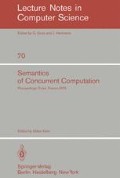Abstract
This paper describes a logic, L, for reasoning about concurrent programs. Programs are similar to those of dynamic logic, with a shuffle operator included. L is a modal logic including the modalities [], meaning "throughout the future," and +, meaning "sometime in the future." These modalities are extended by constraints, so that they can be used to express assertions such as "p holds as long as q does." Programs contain labels. Using labels, it is possible to isolate the behavior of a single process or segment of a process, while at the same time keeping the segment in the context of the whole parallel system. A certain subset of the propositional case of L is known to be decidable.
This Research was supported by the National Science Foundation under Grant No. MCS77-02474.
Preview
Unable to display preview. Download preview PDF.
References
Aschcroft, E. A. and Z. Manna. "Formalization of Properties of Parallel Programs." Machine Intelligence 6, Edinburgh University Press.
Dijkstra, E. W. "Guarded Commands, Nondeterminacy and Formal Derivation of Programs," C.A.C.M. 18, 8, 1975.
Fischer, M. J. and R. E. Ladner. "Propositional Modal Logic of Programs," Proc. 9th ann. ACM Symp. on Theory of Computing, 286–294, Boulder, Col., May, 1977.
Floyd, R. W. "Assigning Meaning to Programs," Proc. AMS Symp. Appl. Math. 19, 1967, 19–32.
Harel, D. and V. R. Pratt. "Nondeterminism in Logics of Programs," Proc. 5th ann ACM Symp. on Principles of Prog. Lang., 203–213, Tuscon, Arizona, Jan., 1978.
Hoare, C. A. R. "An Axiomatic Basis for Computer Programming," C.A.C.M. 12,10, 1969, 576–580.
Lamport, L. "Proving the Correctness of Multiprocess Programs," Mass. Computer Associates, Inc. Mass. 01880.
Manna, Z. and R. Waldinger. "Is 'sometime’ Sometimes Better than ‘Always'?," C.A.C.M. 21, 2, 1978.
Owicki, S. and D. Gries. "An Axiomatic Proof Technique for Parallel Programs I," Acta Informatica 6, 319–339.
Owicki, S. Colloquium presentation, Dept. of Comp. Sci., University of Washington, Nov. 16, 1978.
Pnueli, A. "The Temporal Logic of Programs," 18th IEEE Symp. on Foundations of Computer Science, 46–57, Oct. 1977.
Pratt V. R. "Semantical Considerations on Floyd-Hoare Logic," 17th IEEE Symp. on Foundations of Computer Science, 109–121, 1976.
Pratt V. R. "A Practical Decision Method for Propositional Dynamic Logic," Proc. 10th ACM Symp. on Theory of Computing, 326–337, 1978.
Lamport, L. "'sometime’ is Sometimes ‘Not Never'," S.R.I. International Report, Menlo Park, California, January, 1979.
Author information
Authors and Affiliations
Editor information
Rights and permissions
Copyright information
© 1979 Springer-Verlag Berlin Heidelberg
About this paper
Cite this paper
Abrahamson, K. (1979). Modal logic of concurrent nondeterministic programs. In: Kahn, G. (eds) Semantics of Concurrent Computation. Lecture Notes in Computer Science, vol 70. Springer, Berlin, Heidelberg. https://doi.org/10.1007/BFb0022461
Download citation
DOI: https://doi.org/10.1007/BFb0022461
Published:
Publisher Name: Springer, Berlin, Heidelberg
Print ISBN: 978-3-540-09511-8
Online ISBN: 978-3-540-35163-4
eBook Packages: Springer Book Archive

